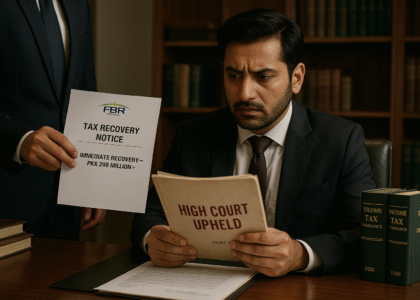Understanding Section 89 of the Income Tax Ordinance, 2001: Taxation of Authors
Section 89 of the Income Tax Ordinance, 2001, addresses the taxation of royalties earned by authors for literary or artistic works. This provision allows authors to spread their royalty income over multiple years, easing the tax burden when significant earnings are received in a single year. This blog explains the section in detail with practical examples, making it easier for authors and tax professionals to understand its implications.
Key Provisions of Section 89
1. Applicability
This section applies to authors of literary or artistic works who:
Spend more than 24 months completing their work.
Receive a lump sum payment as royalties in a tax year.
2. Election for Income Spreading
Authors may elect to:
Treat the lump sum royalty as if it was received over the tax year and the preceding two tax years in equal proportions.
Practical Examples
Example 1: Spreading Royalty Income
An author, Ms. Sara, took three years to complete her novel. In 2024, she received a royalty of PKR 3,000,000. Without Section 89, this amount would be taxed entirely in 2024, potentially placing her in a higher tax bracket.
Using Section 89, she can allocate her income as follows:
2022: PKR 1,000,000
2023: PKR 1,000,000
2024: PKR 1,000,000
This election lowers her taxable income for 2024 and balances her tax liability across three years.
Example 2: Artistic Work
Mr. Ali, an artist, completed a painting after 30 months. He sold it for PKR 1,500,000 in 2024. By electing to apply Section 89, the royalty is divided equally:
2022: PKR 500,000
2023: PKR 500,000
2024: PKR 500,000
This approach reduces his tax burden for 2024 while utilizing the tax brackets of prior years.
Implications for Authors
Reduced Tax Burden: Spreading income may place the author in lower tax brackets for each year.
Record Keeping: Authors must maintain records of project timelines and payments to make this election.
Professional Guidance: Consulting a tax advisor ensures compliance and accurate calculations.
FAQs About Section 89 of the Income Tax Ordinance, 2001
Q1. What is Section 89 of the Income Tax Ordinance, 2001?
Answer: Section 89 provides tax relief to authors by allowing them to spread lump sum royalty income over three years.
Q2. Who can benefit from Section 89?
Answer: Authors of literary or artistic works who spent more than 24 months completing their work and receive lump sum royalties.
Q3. What is the benefit of spreading royalty income?
Answer: It reduces the tax burden by balancing income across multiple tax years, potentially lowering the applicable tax bracket.
Q4. How is the income spread?
Answer: The lump sum royalty is divided equally over the tax year and the preceding two years.
Q5. Does this section apply to scientific authors?
Answer: It applies broadly to literary or artistic works, but the specifics depend on the nature of the work and the royalty terms.
Q6. Can the author decide not to use this provision?
Answer: Yes, the provision is elective and not mandatory.
Q7. What records are required to make this election?
Answer: Evidence of project timelines, royalty agreements, and payment receipts.
Q8. What happens if the work took less than 24 months?
Answer: Section 89 does not apply to works completed in less than 24 months.
Q9. Is the election permanent for future royalties?
Answer: No, the election applies only to the specific royalty payment.
Q10. Can other income be treated similarly?
Answer: No, this provision is specific to royalties from literary or artistic works.
Q11. What qualifies as a lump sum payment?
Answer: A single payment made for royalties, not recurring or periodic payments.
Q12. Are royalties received in installments eligible?
Answer: Only the lump sum royalty amount qualifies, not periodic payments.
Q13. How do I claim this election?
Answer: File the necessary documentation and returns reflecting the election with the FBR.
Q14. Does this provision apply to deceased authors?
Answer: Section 89 applies to the author during their lifetime; other provisions govern estate income.
Q15. What penalties apply for incorrect claims?
Answer: Misrepresentation or incorrect filings can result in penalties or audits by the FBR.
The information provided in this blog reflects a general understanding of Section 89 of the Income Tax Ordinance, 2001. Interpretation of tax laws can vary and may depend on individual circumstances or legal viewpoints. It is highly recommended to consult a tax advisor for personalized advice and compliance.






